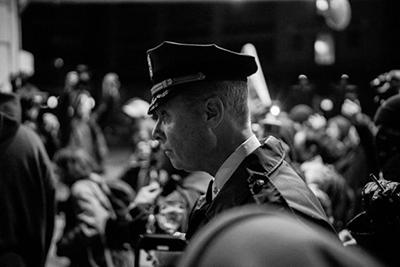
By Brittany Packnett Cunningham
(Source The Cut):
It’s near impossible to find language visceral enough for the rage I feel about the murder of Jordan Neely. Not because it is foreign to me. No, this rage is familiar and practiced. It rises in my chest like fire every time another Black name becomes a hashtag, every time one famous flag has reason to fly: “A man was lynched yesterday.”
That fire has taken up residence in my body; it has occasion to visit me often and knows each nook and cranny. And since May 1, when Jordan, a Michael Jackson impersonator and unhoused man complaining of thirst and hunger on the New York City subway, was choked to death by a white former marine, the fire has stayed.
Across social media, lamenting onlookers privileged enough to think America’s racism dissolved after the protests of summer 2020 have asked how this could happen. Marginalized people know the answer. Intimately understanding the ways of an oppressive world is the only way we can survive. Black people know the many manifestations of supremacy well; we take and share copious notes each time it raises a hand against us. Anything less would be unsafe.
In the wake of Jordan’s murder, Kenneth Jones’s and Tema Okun’s definition of the “right to comfort” haunts me: “The belief that those with power have a right to emotional and psychological comfort … I have a right to be comfortable, and if I am not, then someone else is to blame.”
When Daniel Penny was not comfortable on the F train, he single-handedly decided that Jordan was to blame.
We know that white perpetrators are celebrated and Black victims are vilified. The immediate aftermath of Jordan’s murder was no different: A police officer mayor and a white governor asked us to withhold judgment until an investigation was complete, mainstream news outlets protected Penny’s identity for lack of any criminal charges, and racist rags celebrated him as a heroic “vigilante.” But words matter: Vigilantes respond to crimes. So what precise atrocity did Jordan commit, to be sentenced with capital punishment by a judge and jury of one?
He was discomforting. To a train full of people who would rather look away, in a city whose leaders already did, Jordan’s justifiably distressed expression of his hunger and thirst was not heard as a plea for help. It was seen as an attack on white comfort.
On top of his poverty, Jordan struggled with mental illness. To people like Newsweek’s deputy opinions editor — who tweeted, “I ride the subway a lot. Not a week goes by that a mentally ill person doesn’t get on and terrorize the entire car—especially women, especially Asians” — mentally disabled subway riders aren’t neighbors, they’re terrorists. But Jordan was no danger to passengers’ physical well-being, as eyewitnesses confirmed that he did not attack anyone. In fact, disabled people are disproportionately likely to be victims of violent crime, and Time reports that studies show people with disabilities or who are experiencing a mental health crisis make up one-third to one-half of total police killings.
If only white America were as disquieted by the evil on which its comfort is built as it is by our demands to be treated humanely. If only your comfort were not so damn expensive for the rest of us.
Black people who dare reflect back to America the shame of her sins have always been punished. With few words, Jordan’s basic, human needs shouted just a little too loudly, drawing attention to the starving underclass that props up our wealthy society. His mental illness screamed of profits prioritized over people; his infrequent treatment diversions were no match for the 44 times he’d been thrown in a cell before his murder. His Blackness disquieted the American ideals and sensibilities that proclaim us all equal. His existence, on that train, on that day, exposed just how poorly America cares for her people and how poorly we care for one another.
Entering public spaces all but guarantees some discomfort in a country unashamed of its violently ineffective systemic responses to housing and mental health crises among its residents. There, each of us, whether we care to or not, is forced to come face to face with the unkept promises of the democratic experiment. The privileged get to merely observe the nightmare of poverty and despair instead of live it, and when their discomfort grows too great, they take matters into their own hands. Jordan paid the ultimate price to preserve their privilege, while it took more than ten days for his killer to be charged with mere second-degree manslaughter.
White supremacy gleefully uses violence as both a cudgel and a cautionary tale. Its true patriots get their hands dirty, meting out violence with the blessing of those with more sensitive stomachs. While Jordan’s life was stolen, his killer is celebrated by those who appreciate his willingness to protect their collective comfort. In their calculus, Jordan’s life was an acceptable sacrifice, and they are leveraging the public spectacle of his murder — like the lynchings of the Jim Crow era or the killings of Michael Brown, Ahmaud Arbery, and Breonna Taylor before him — to warn others who might unwisely step out of line.
Or be hungry and Black on a subway.
There is not a Black person in America who, somehow, some way, has not seen this in action. Even those who refuse to believe their own eyes know, deep down, that disrupting white comfort is a crime punishable by death. It is a sentence upheld not only by violent perpetrators, but by everyone who casually advances a culture that prioritizes white comfort above all else. That culture killed Jordan before his murderer ever approached him.
You, reader, may feel defensive about the accusation that you promote such a culture. Of course, it could never be your hands around Jordan’s neck. But would your voice have been silent on that subway car as the life drained from his eyes? Would you cast your vote for those who punish instead of heal? Do the headlines of your preferred papers promote Jordan’s humanity, or call him a criminal? Do you insist that your comfort is not to be disrupted–at the coffee shop, your child’s school, your workplace, your block? The answer is yes, even if you don’t intend it to be. Preserving your comfort is the promised inheritance of internalized supremacy. It was passed down to you, and at this point it is muscle memory, uncomfortable as that truth may be.
Intellectually, I know how we got here. But the fire in my chest forces me to wonder what our alternative future could be, if only we were more uncomfortable with the conditions in which Jordan was forced to live than with his expressions of need. If only white America were as disquieted by the evil on which its comfort is built as it is by our demands to be treated humanely. If only your comfort were not so damn expensive for the rest of us.
Sometimes, when I play with my son in the morning before my workday begins, the fire in my chest will subside for a few moments. Watching him discover the world at his young 16 months is a balm. Joy washes over me like a cooling tide — until anxiety rises up in its place. I pray my Black child is never in public distress around those who see him as a nuisance and not a neighbor. I’m raising him with the intention to live without apology, and he will, without any doubt, disrupt the comfort of white supremacy by simply existing proudly in a Black body. But instead of prepare him to deal with the consequences, I’d rather help shift the world in which he’ll enter. I don’t want to teach him the rules. I want us to change the game. This country hasn’t given me much optimism that it will do so in his lifetime, but it remains all of our responsibility to try.




Be the first to comment